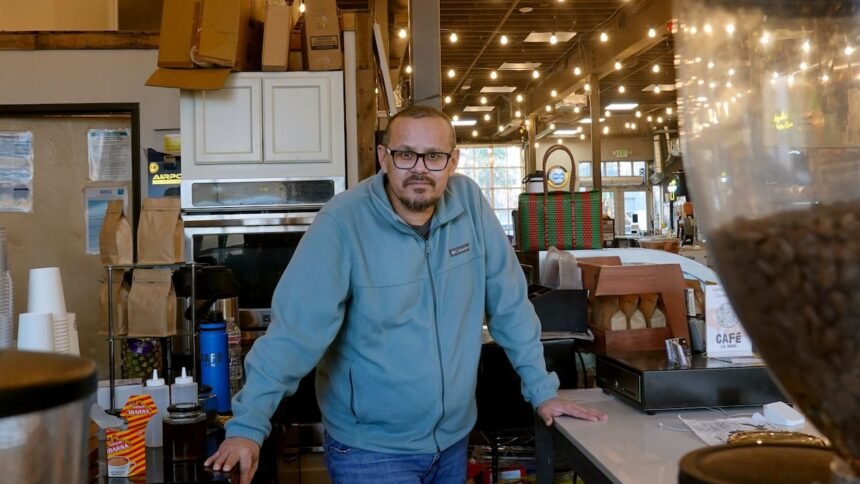Editor’s note: As President Donald Trump takes office, OPB is providing a look over the week surrounding inauguration to understand how Oregonians voted, how they’re feeling now and how the new administration could affect Northwest communities through top issues like immigration, tariffs, criminal justice and the I-5 bridge replacement.
Luis Lamas at his coffee stall, Café La Onda, in Woodburn, Ore., Jan. 15, 2025. People often share with him their fears of deportation as President Donald Trump takes office once again.
Alejandro Figueroa / OPB
Days before the inauguration, Luis Lamas was sitting in a storage closet behind his coffee stand — Café La Onda — in Woodburn. The day was winding down, he had already wiped the counters and washed the dishes, and sat scrolling on his phone.
The coffee stand is inside the food court-style Metropolis Marketplace downtown. Lamas is a familiar face in a diverse downtown where many of the businesses are Latino-owned, most store fronts have Spanish signs in their windows and almost two-thirds of the city’s residents are Latino or Hispanic.
Lamas knows many of them, and they know him. “I’m like a therapist sometimes,” he said in Spanish, when customers walked in and made small-talk.
Lately, he’s noticed a shift in the tone of those chats.
“There is fear, but there is also a resignation,” Lamas said.
It’s a familiar sentiment. During the first Trump administration, communities across the U.S. saw an increase in immigration enforcement. In Woodburn, officials worked to build trust with community members as U.S. Immigration and Customs Enforcement officers investigated and made arrests in the area.
It’s an effort local officials are undertaking again as President Donald Trump returns to the White House. Just hours after taking office Monday, Trump signed a series of executive orders related to immigration, including declaring a national emergency at the southern border, limiting asylum claims, and a push to end birthright citizenship (that order was temporarily blocked by a federal judge in Seattle on Thursday).
OPB spoke with a number of Woodburn residents who said they’ve felt tension building over the past several months. And now, as Trump’s second term begins, Lamas said fear and anxiety over arrests loom once again.
‘They arrive with fear’
Before Lamas immigrated from Mexico to the U.S. in 2021, he worked an office job at a construction company that had contracts with the Mexican government. But when the administration changed in 2018 to then-President Andrés Manuel López Obrador, his company lost the contract and Lamas lost his job. His family owned a small clothing store that kept them afloat for a while. “Then came the pandemic,” he said. ”All business went down, there was no economy.”
So Lamas moved to the U.S. with a friend. He took any job he could find, some paying as little as $300 a week. He’d work in roofing under the scorching Texas sun, watching men get sick from the heat and then get back to work. He pruned almond trees in the San Joaquin Valley of California, even without knowing what limbs to cut, and drove long distances to work in nurseries across Oregon.

A mural near North Front Street in Woodburn, Ore., Jan. 15, 2025. The city of about 30,000 is made up largely of immigrant Mexican or Latino residents.
Alejandro Figueroa / OPB
“I had never done anything like that in Mexico,” he said. “Your back would hurt all day, you’d feel pain sometimes all the way to your fingertips.”
Those experiences, Lamas said, have helped him connect with people.
“I’ve become more attuned to other people’s pain,” he said. “When they get here, they have so many needs, they don’t know where to go, or who to ask for help because they arrive with fear.”
For some, those fears now include increased immigration enforcement from the Trump administration. Whenever the topic comes up at the coffee shop, Lamas said he gets a wide variety of thoughts.
“One woman told me, ‘I’ve already been here 20 years, I already did what I came here to do. Whatever I have to sell, I’ll sell and go back to Mexico,’” he said. “She told me, ‘If I’m here, it’s only because of my children. It’s the only thing that worries me the most, my children.’”
Another man recently told Lamas he didn’t know anything about the increased immigration enforcement and plans for mass deportations from the new administration.
“Ignorance also exists,” Lamas said. “Some don’t know what’s happening. Some don’t know what’s coming.”
Fear during the first Trump administration
Early on in the first Trump administration, people in Woodburn described heightened attention from immigration enforcement.
In 2017, one month after Trump took office, two buses of farmworkers heading to harvest flowers were stopped near Woodburn as part of “a targeted enforcement operation.”
Eleven people were detained, and seven were taken to an immigration detention center in Tacoma, Washington.

FILE-In this March 1, 2017, photo, residents of the predominantly Latino town of Woodburn, Ore., meet to talk about increased detentions by federal immigration agents. The meeting was held in the offices of PCUN, a union that represents farmworkers and others and which is housed in a former church. Now, these community members are facing similar threats.
Andrew Selsky / AP
After that raid, people in Woodburn reported a significant downturn in business and widespread fear.
“That sent a chilling effect in our community. After that happened, people were not showing up to work. Children were not showing up to school,” said Reyna Lopez, executive director of Pineros y Campesinos Unidos del Noroeste (PCUN) — an advocacy group for Oregon farmworkers. “It is not good for our community. It’s not good for our local economy. ”
Similar fears are taking root again, Lopez said. In some cases, she said, seeing an unmarked white van or unfounded claims on social media can set people on edge.
“The community has a lot of questions, more than anything,” Lopez said. “It’s really hard to trust what people are seeing on social media or even what they’re hearing. They’re really looking for trusted information, vetted information, things that are factual.”

FILE-In this Dec. 6, 2019 photo, Reyna Lopez, the executive director of a farm worker union known as PCUN — an acronym in Spanish for Pine Workers and Farmers United of the Northwest — at the union’s headquarters in Woodburn, Ore.
Andrew Selsky / AP
In response, PCUN, the Oregon’s Farmworker Union, Woodburn’s Education Association and a network of dozens of other Latino and immigrant advocacy groups have coalesced to put together a wide range of resources like “know your rights” meetings, legal services and training rapid response teams ready help families if or when there is a raid.
“Another thing we’re asking folks to do is some [contingency] planning. If it is the case that you’re not here tomorrow, what happens to your children who might be citizens and are in local public school? What happens with your house?” Lopez said. “That kind of planning is really hard and it’s not an easy conversation to have, but it’s important.”
Woodburn officials look to keep community at ease
Woodburn city officials said they’ve taken some of the lessons they learned from the first Trump administration to engage with the community.
“We really want the community to feel safe,” said Scott Derickson, Woodburn’s city administrator. “We try to mitigate unreasonable fear in our community and encourage people to access services and resources that we offer as a local government without fear.”
The city has intentionally met with local farmworker advocacy groups and religious institutions to let people know about the role of city government, and the programs and services available to people without fear of arrests, Derickson said.
Jason Millican, Woodburn’s acting chief of police, said it’s common for his office to respond to a call from someone who might be undocumented. He doesn’t take that trust for granted.
“It’s understandable that people do have a fear. We understand that,” Millican said. “Our message is: Please [do] not fear local law enforcement. We cannot have people who are victims of crimes afraid to call the police.”
Oregon’s sanctuary laws prohibit local or state police authorities from asking about a person’s immigration status or sharing information between public entities and federal immigration officials. The city will always uphold that policy, Derickson said.
“The city has no desire to take on federal responsibilities,” he said. “People aren’t going to be subject to immigration policies in City Hall if they need to come to City Hall or the library or our schools. We don’t want people to retract from the community because of unfounded fear.”
Oregon’s sanctuary law is already facing challenges. A three-page memo sent this week from the U.S. Department of Justice orders U.S. attorneys across the country to investigate, and potentially prosecute, local officials who refuse to follow the new administration’s immigration policies.

A water tower near a train track in Woodburn, Ore., Jan. 15, 2025. The town faces fear and anxiety following the second inauguration of President Trump.
Alejandro Figueroa / OPB
Despite all of the uncertainty, Lopez said she feels it’s brought neighbors closer.
“There really aren’t enough resources in the world to arrest every single person, to question every single citizen, every single immigrant,” she said. “We have to continue to live our lives. We have to continue to work. We have to continue to be able to provide for our families.”
As for Lamas, he’s noticed fewer people coming by the coffee shop since the election.
“With the policies that are coming, we don’t know what’s going to happen, there’s so much uncertainty,” he said.
For now, Lamas plans to keep talking with people – through their fears, their hopes and the unknowns.











